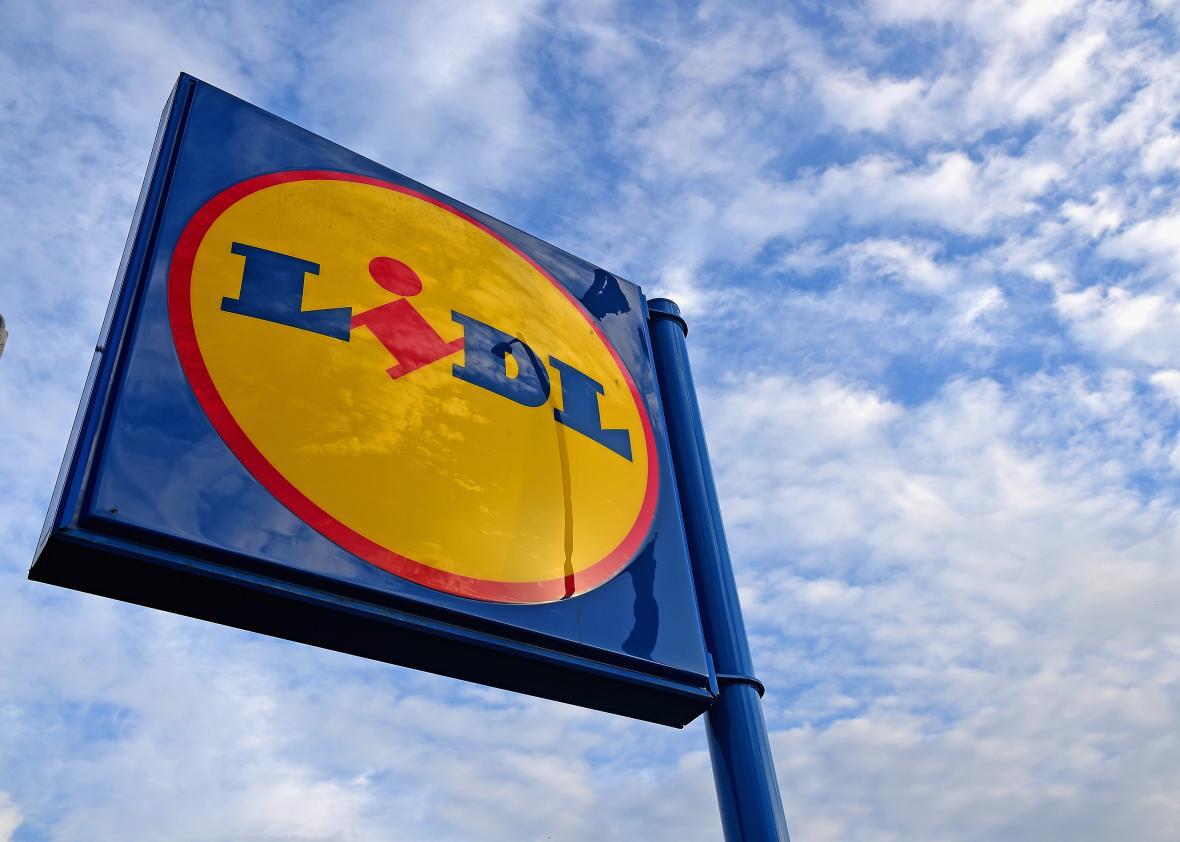Apparently, Americans can’t get enough of the discount German grocery store experience. The popularity of Aldi, the German monolith whose no-frills displays and rock-bottom pricing have had Americans begeistert since 1976, has not gone unnoticed by the head office at Lidl, otherwise known as Aldi’s chief Fatherland competitor, its arch-nemesis, the perpetual Dorn in its side. And now the younger, feistier fighter in Germany’s biggest little war (Kleinkrieg, or “feud”) is yearning to breathe free on our shores. By 2018, Lidl plans to attack the Eastern Seaboard with 150 new harshly lit emporia of off-brand Tostitos.
Who will win? Impossible to know. Sometimes, it’s hard to tell the two stores apart. Aldi’s got a weird four-letter name? Lidl’s got a weird four-letter name. Aldi’s got 10,000 stores in Europe? Lidl’s got 10,000 stores in Europe. Aldi’s got cardboard pallets full of deeply discounted private label goods? Lidl’s got—you get the drift.
In its potential to tap into my country-people’s insatiable appetite for generic goldfish crackers, Lidl seems poised to suck up at least part of Aldi’s market share—not unlike the very cheap, possibly illegal vacuum cleaners (Staubsauger, literally “dust suckers”) that sometimes appear in the perplexing nonfood sections of both stores. (Would you like a set of Christmas lights in July, for $3.99? Ja!) And, given that I am already a lifelong devotee of my own neighborhood Aldi, I bid the encroaching annexation by Lidl a herzlich Wilkommen.
However, I also have some extremely important questions. Nummer Eins: Precisely which parts of the delightfully pedantic Teutonic grocery experience will Lidl import? Will they charge for bags and expect you to bag your own stuff and schnell? Will their cashiers, as Aldi’s do, remain seated, rather than stand, during checkout, as is the practice at German groceries? Will those cashiers yell at you every time you’ve committed a major human rights violation such as not producing your cash payment in exact change? (Try to break a 100 euro note with a straight face at a German Lidl and see what I mean.)
Also, will Lidl’s private-label goods vary in quality as much as Aldi’s do? Aldi’s chocolate—which I have procured for as little as 25 cents a bar—is delicious and hails direct from Belgium, but woe unto the soul who attempts to consume its O-shaped oat cereal, which is a gravel garbage nightmare.
Moreover: Will Lidl’s size (about 30,000 square feet) work in its favor? American Aldi stores, typically around 10,000 square feet, are generally best for supplementary or specialty trips, to stock up on cheap acetaminophen or pistachios. I would probably never buy bread there. Lidl’s expanded footprint will be filled by more name-brand stuff, but the company might be overestimating the novelty of its size; 30,000 square feet is still considerably smaller than a Walmart Supercenter.
And finally and most importantly: As some Aldi stores do, will Lidl carry the single most important German import in the history of foodstuffs, namely Erdnussflips—basically, peanut-butter Cheetos? They may sound vile, but they are irresistible.
Oh, yes, there’s also the small matter of Lidl’s disputed labor practices, which have included alleged poor pay and wage theft, employee surveillance, and a particularly obnoxious “English-only” policy at the U.K. stores (which, of course, encompass Wales). Perhaps Lidl’s real eagerness to expand stateside has less to do with our hunger for a delicious Pick-Up (“Der Picknicker!”), and more to do with our welcoming environment for such corporate malfeasance.
Still, I remain optimistic. There can never be too many German grocery stores, in Germany or elsewhere. I hope Lidl and Aldi can coexist in our land in friendly American market-driven competition—or, barring that, engage in a price war, ending in free Erdnussflips for everyone.
